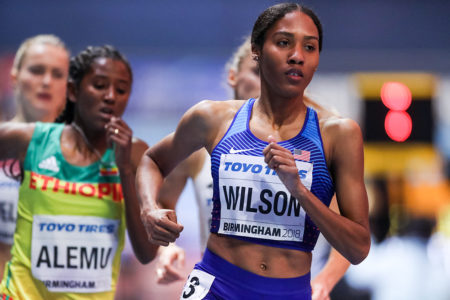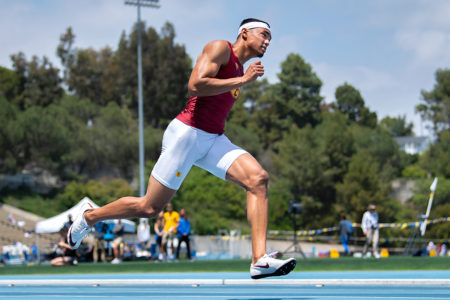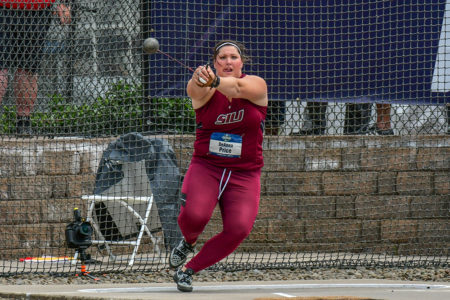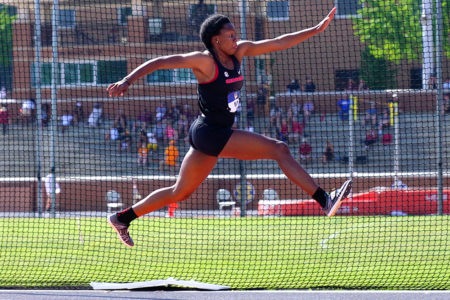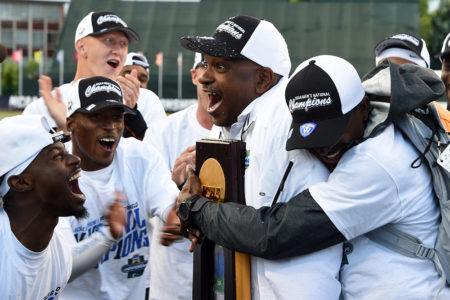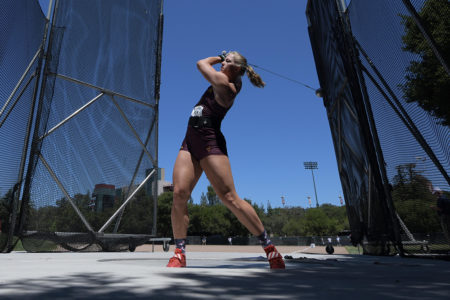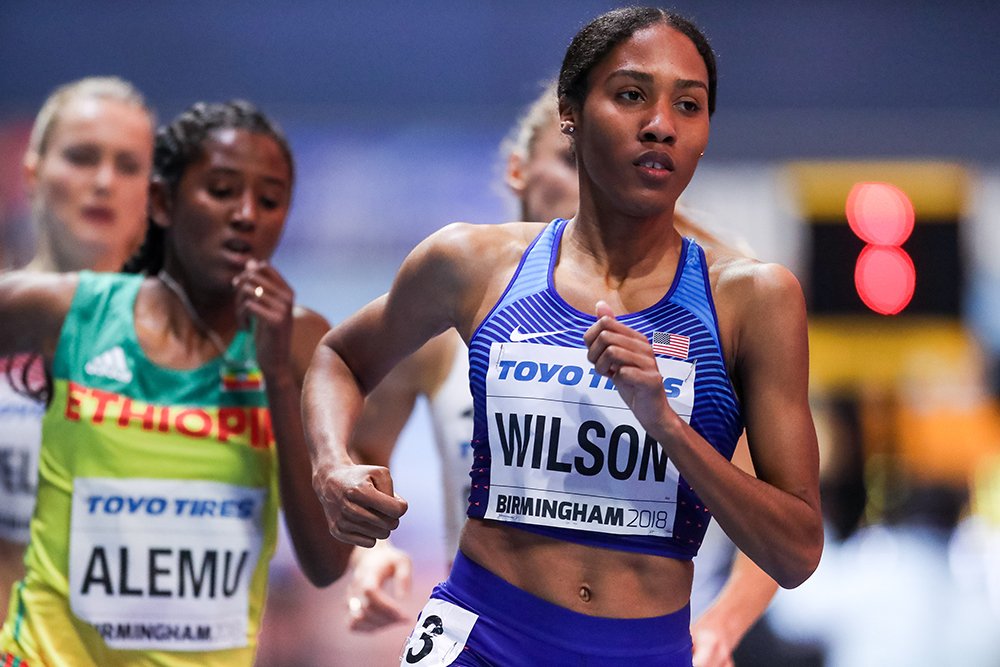
Ajee’ Wilson, it seems, has been around forever, but the leading U.S. 800 runner is still only 24. A one-time age-group phenom, she remains No. 4 on the all-time high school list with her 2:00.91 from ’12. That year she made it to the semis of the Olympic Trials. Later that fall she shocked many by turning down an NCAA career to go pro, but the next summer, she silenced her doubters by placing 5th at the Worlds with a still-standing American Junior Record of 1:58.21 and earned the No. 8 spot in the World Rankings.
Since then, working alongside coach Derek Thompson, the Philly-based Wilson has been a perennial powerhouse on the world stage. Last year she foreshadowed her World bronze with an American Record 1:55.61 in Monaco. Her key training partner, Charlene Lipsey, herself broke through last year with a 1:57.38 PR and a No. 8 World Ranking.
Wilson’s ’18 outdoor campaign has opened well, with a PR 4:05.18 in winning a 1500 at Swarthmore and the No. 6 American 800 ever, 1:56.86, to take 2nd at Pre.
Wilson talked with us at the end of May about her beginnings, her training and where she wants her career to go from here.
T&FN: Looking back on your earliest days in the sport, does it ever surprise you how far you’ve come?
Wilson: I’d say every year—especially through high school—there was always something kind of new that I didn’t even know existed in our sport. The first time that I did well at World Juniors, I didn’t even know that was a thing. I didn’t know it was even a possibility. So every new step it’s just like a surprise that I never would have imagined in the past.
T&FN: What got you started as a runner?
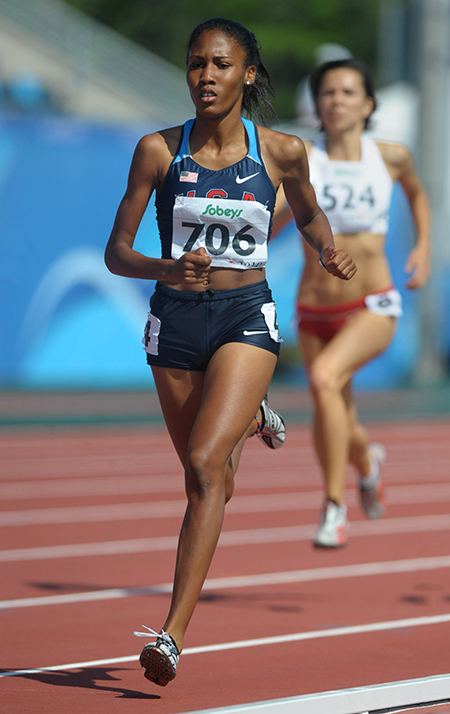
Wilson: I started running because my little sister, Brietta, did it. She’s just almost a year younger than me—we’re “Irish twins.” She started running track and she would come home and say how fun it was and how many friends she had. So, I just followed her lead and started running because of that.
T&FN: Was there any point as a young runner when you started to dream of glory and say, “Wow, I could do something here”?
Wilson: It wasn’t until I got to World Juniors where I got 5th. Just running there opened up my eyes. I looked at track differently and I was like, “OK, next opportunity to do this is another two years and next time I come here, I want to win.” I would say that’s kind of when I started actually following goals in track & field.
T&FN: You bypassed a scholarship at Florida State and an NCAA career to go straight to the pros. Do you ever have any second thoughts about that?
Wilson: Currently no, I think because like the outcome has been successful, it’s been positive. I struggle to imagine seeing my life any other way now because it’s just my normal. It was easily one of the best decisions me and my family had ever made. I have no regrets. When I first signed initially it was difficult, even being around town—I went to community college my first year. It was like, “Oh, you’re still here. I thought you were going to Florida.” Having those awkward conversations, you know. I was more reserved and not as confident in my decision. But as time went on and I was comfortable and I was doing well, it was definitely easy to just to be happy where I was.
T&FN: And you graduated from Temple last year?
Wilson: In kinesiology. My concentration was exercise and sports science.
T&FN: Did you find it tough to juggle being a serious student with being a pro athlete?
Wilson: I didn’t find it too difficult. The high school that I went to was Allied Health & Science. I didn’t actually go to Neptune High School. Allied was a strong academic school, so in my years there I did find it difficult to find that balance. But it did prepare me for college. So it was relatively seamless to me to get the work that I needed done, study when I needed to and prioritize and just plan my time accordingly. I definitely enjoyed being a student while I was running. I miss it every now and again, having done it so long and having that balance.
T&FN: So now you’re an experienced international veteran athlete at the age of 24. How does it feel to be young in age and so old in the sport?
Wilson: I do forget sometimes how age is a thing, you know? When I first started, a lot of other runners on the circuit were like, “Oh, you’re like 12?” Nowadays my age isn’t a question even though I’m still on the younger side. It used to be kind of weird. But now I just feel like I fit in.
T&FN: Do you feel like you’re coming into your physical prime?
Wilson: Over the past couple of years I’ve felt myself change. I deal with or handle workouts better and I’m training better. I definitely think there’s more than 800 I want to do, I can do, and as I get older, you will see me stepping into the 1500. I don’t know if it’s my prime yet, but I definitely know that I’m coming into my own.
T&FN: What’s your offseason training like?
Wilson: We’re at this local park and I’m not really sure how long exactly this loop is. But we have this little loop that we do and it’s usually just like intervals, so it’ll be like 6×1 lap or like 2-lap/1-lap/2-lap/1-lap 3 times. When I first started running professionally we were there and I hated it. We went to the park so much. Like there’s hills and it’s hot. But I definitely think it’s done wonders for our training group in making us strong. It gets you fit. I’ve gotten to love it and I prefer it during the fall, over, say the longer run.
T&FN: Do you keep track of how many miles you’re putting in?
Wilson: Kori Carter created a training journal so I bought one and I started logging my stuff. I just wasn’t consistent enough with it. Mentally I’m a lot tougher now, but when I was younger, if I knew “OK, we’re doing this amount of miles per week,” it was daunting and I really don’t want to do it. So I don’t typically… Well, I don’t at all keep track of mileage or anything like that.
T&FN: You must have a feel for how your training compares to your peers on the circuit.
Wilson: I don’t really talk to a lot of people about their workouts, but what I will say that I think is unique which we have built on over the years, it’s the approaching the 8 more from the strength side. So when Marielle [Hall] was here, we were with her most of the fall, a good part of the beginning of the season and just holding on and trying to hang in there for her workouts, or it was tapered down a little bit for us. So I think in comparison we might do a little more strength work than other people, more 1500/mile-based work. But I think when it comes down to core 800 workouts, we all pretty much do the same thing, 200s, 300s, you know.
T&FN: Do you incorporate much weight training?
Wilson: In the fall we do. When it comes to outdoors in the season we focus more on bodyweight exercises, a lot of med-ball stuff and a lot of core, but we don’t really see the weight room much once the season is in play.
T&FN: What’s the workout that you most hate?
Wilson: We’ll do 1200 and then a 400 and we have to do that 3 times. Some people have to do it 4, but if it’s me I may make it through 3 and it just kills me. I think I’ve gotten better at it but I’ve yet to officially master it. It just does not like me at all.
T&FN: What are your fun workouts?
Wilson: I love 200s. Premeets, we’ll do like six 200s. That’s probably one of my favorite ones. Another fun one is the 300 repeats as well, with long recoveries. Those are probably my top two favorites.
T&FN: In the last year, has there been any change in the emphasis of your workouts?
Wilson: Getting stronger on the 1500/mile side, because running the 800 in Berlin last year, I wasn’t too far off so it’s like my speed is there, but in the last phases of the race, that last 60-70m is kind of where I end up dropping off. So just getting a little stronger has been the focus.
T&FN: That 4:05.18 at Swarthmore says a lot about your strength.
Wilson: Typically one or two times a year I’ll do a 1500 or a mile. This year yet we’ve just done a couple more because training has been going so well. It’s the same approach, but he’s really keen on just gradually improving and not trying to shock your system too much. So it’s been a slow work in progress. But like I said, I feel like I’ve adapted and gotten used to training and my body’s ready and mature to test those things a little bit more now.
T&FN: Are we ever going to see you be a 1500m specialist?
Wilson: Hopefully. My coach is really a kind of gradually-chip-away kind of person. Definitely as I get older I’ll be testing out the 1500 a little bit more. Charlene is kind of doing that now. We’ll see how things go and what he has planned. But I’m definitely sure that I’ll be moving up to the 15 soon enough.
T&FN: Charlene Lipsey has improved so much since she started training with you and coach Thompson. Are you benefiting from her being there?
Wilson: Definitely. Charlene’s work ethic is insane. Her attitude at practice is uplifting and positive and having her around has been huge. Training-wise, this year I’ve done a lot better. Anything on the longer end it was just me trying to stay close and trying not to fall off so hard that I had to get pulled out of a run or a rep. She was just like that much better and that much stronger than me. It was a real give-and-take. On the speed stuff, we were working together and she was getting more help from me than on the strength stuff. The longer distances, you know, I was getting a lot from having her there. So yeah. I’m so glad that she decided to come out here and it’s definitely paid off for the both of us.
T&FN: You’re obviously quite close. What’s it like having a friendship with someone who lines up to race against you regularly?
Wilson: Everyone always asks that and I don’t know how to explain it but it’s really easy actually. We have so much in common and we get each other; we get what we have to go through, especially when it comes to racing. It’s nice to have that kind of us-against-them type thing. If I’m not confident or I’m not feeling the best going into the race, it’s like, “Hey, we do the same thing. We train the same, we both got this,” and it’s easier sometimes to put your confidence and belief in someone else than yourself. So we definitely feed off each other’s energy when it comes to racing. That being said, we’re still competitive and when I’m racing, I know that if anybody’s coming, I know she’s going to be there and I know that I need to make sure I’m going to the line or else she’s coming.
T&FN: What is it about the coaching relationship you both have with Coach Thompson that makes it so effective for you?
Wilson: I have an amazing coach, you know? He’s truly a student of the sport—he can run you back stats from years ago. He knows everybody. He knows how they race, he knows just a bunch of information that he has constantly been observing over the past 25 years. He never ran track. So everything that he knows and he does, he learned from reading and studying and talking to people. He’s had a lot of time to practice and he’s found a formula that works and training that works. And outside of the training, he didn’t run track, but he used to be an athlete. So he gets it. He definitely understands where we’re coming from and how it is to train and maybe not 100% all the time, but he gets what it is like to be an athlete. I think that dynamic helps with the whole process of training.
T&FN: In your job, you have to travel a lot. Does it get tiresome?
Wilson: I actually do like traveling. I do well on planes. Usually before we take off, I’m asleep. I like to travel and more importantly I like to just go different places. It’s easily the best part about what we do. Running age-group in the summers—we didn’t go on vacations as a family that often but track was a surefire way. Every summer we were going somewhere and it was always super cool places like New Orleans or Tennessee or Michigan. The traveling part—I love it.
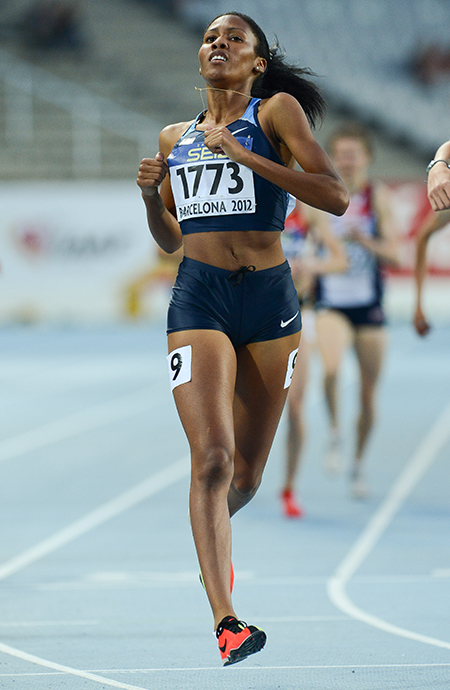
T&FN: As opposed to simply the big ones that figure in the World Rankings, are there any races in the past that stand out in your memory?
Wilson: One of my favorite races—with my parents, it always was small stuff like, “Hey, if you run this time or you win the race, like you’ll get this snack or whatever.” And when I was in high school the bet was that if I ran 2:04, then I could get a dog. And I wanted a dog for like forever. I would toe the line and it was like, “I need this puppy.” Yeah, [2:04.94 at the New Jersey high school state meet in ‘10] was one of those memorable races. I got a dog. His name is Zeus. He’s a Shih Tzu/Yorkie mix.
T&FN: In races, you seem to love to lead. What’s your thinking behind that?
Wilson: That’s been something that’s worked and something that I feel comfortable doing. When I first started running professionally that was not how I approached races. It was just hang in there and give it what you had towards the end. I think the first race where I kind of went after it was 2013 in Stockholm where I went a little earlier and towards the front of the pack. I remember thinking, “Whoa, you’re going for it! Finish now!” My body’s gotten stronger and I’ve gotten more mature. My coach lets me do whatever I feel comfortable with and you know, in high school that what I was used to. His goal was to make sure that physically I was able to still do that. That’s just what’s comfortable and what works for me.
T&FN: Would you ever rather have the fast time than the win?
Wilson: Every race, the goal is always to win. Very rarely do we run for time. My coach always says, “If you run for place, the time will come.”
T&FN: On the circuit, who are the peers that give you a boost and make you feel ready to race?
Wilson: I would say it’s a tie between like Chanelle Price and Kori Carter. Chanelle is positive, inspirational, just a great all-around person. Any time I’m around her, I feel her energy. And then Kori is similar, she’s high energy, no chill and great person to be around. And of course, Charlene. Charlene is my road dog now, she can’t get away from me if she tried.
T&FN: Not to bring you down, but it’s time for some tough questions. What’s been your toughest moment in the sport?
Wilson: I think the toughest thing definitely was last season. It was easily the toughest in track and the toughest in my life. It turned around towards the end, but yeah, that was definitely a rough time.
T&FN: The “positive test” and the USADA warning—how do you get past something like that?
Wilson: I think what made it kind of easy—not “easy”—scratch that word. What helped, I finally internally knew my truth and I had faith. I knew what the truth was, but it wasn’t until having my peers and other athletes reach out and let me know that they were thinking of me, that they understood the situation. More than anything, that they believed me made it a little less difficult to deal with and work through.
T&FN: You’ve had other frustrations, most notably missing the ’15 Worlds in Beijing with injury. Does that pale in comparison with the USADA experience?
Wilson: [The doping warning] is still pretty sore. It wasn’t too long ago. That’s the first thing that hit me. At the end of the day, it happened and it’s not something I’m ever going to be able to forget about or shy away from. I’ve made that mistake [of trying to forget it] before and now it’s kind of like a slap. Not even a slap. It’s just like a harsh reminder. It happened and I just have to accept that and now I’m going to get asked about it.
T&FN: You’ve always been so calm and reserved in public, and we’ve seen that in your responses to questions on the hyperandrogenism controversy that’s affected the 800. What’s behind your approach on that?
Wilson: People have been talking a lot about it now because [the IAAF] recently changed the rule. But even before my approach is just—it’s unfortunate. You can only control and really be invested and concerned about the things that you have control over and at the end of the day that’s not something that I do. And so my job, I’ve got to train and focus on what I can and race and compete. I’ve been that way with everything in my life. Even with school, like my mom would laugh at me because in high school I was really super-academic and my friends would be like, “Oh my gosh, what’s going to happen on the test?” And I would just be chilling in the back like, “Hey, either I’m ready or I’m not. I studied. I know that I’m prepared. I can do as much as I can. I don’t know what the questions are going to be. I just have to go and you just do what you can, you know?” I typically leave it up to the people in charge.
T&FN: Some would argue that if those coming hyperandrogenism rules had been in place all along, you would have a few more gold medals in your pocket and maybe a little bit more money in your bank account. Is that a frustration at all?
Wilson: I can’t say I haven’t thought about. Anybody who says they haven’t, it wouldn’t be truthful at all, but I wouldn’t say that I’ve been frustrated. The background that I came from, you know, what I get now is more than I would’ve ever dreamed or imagined. So I’m super grateful and thankful for what I have and what I’m able to do for my family and my community. I definitely don’t think that looking at it as “I’m missing out” would be greedy or anything. But I don’t have any super-serious or major desperation about having missed out on stuff like that.
T&FN: In a sport with the World Champs, the World Indoors and the Diamond League, how important are the Olympics to you?
Wilson: Super important. Making another Olympic team is huge. And you know, doing better at the Olympics is more important than anything. It was a really weird feeling being there. Being excited I was at the Olympics, because I hadn’t even dreamed of it, but there was a little cloud over it because I knew where I was physically and I just didn’t feel like that was the best that I could put forward at that stage. Having my family and friends being so supportive and so excited that I was there, but there was a little element of feeling like I hadn’t done all that I could have to make them a little more proud. I just want to do better at this, making the next Olympics and do better. That is definitely something that I think about and is one of my goals.
I love running. I love competing. One of my favorite things about running was just the “socialness” of it. It’s an individual sport, but it’s still very much a collective.
T&FN: In terms of unfinished business, you’ve got the World Youth gold medal and the World Junior gold. Is it a goal to finish the set with a senior gold at the Worlds?
Wilson: That’d be awesome. I think Kirani James has done it and I was like, “Oh, that’d be cool to get all of the levels.” In any meet, I want to win. I want to get that gold. So with that approach, I think that, well—I hope that I’ll be able to accomplish that someday.
T&FN: But if you do complete the set, then you have to do the World Masters.
Wilson: [laughs] I don’t know about all that. I’m always on the fence about when I’m done like, am I going to be done-done? Or you know, still dabble a little bit, but we’ll see.
T&FN: Your American record is 1:55.61. Do you have more in you?
Wilson: I think that I do. Like I said, my coach is a student, so he’s watched the race over a bunch of times. Of course, after the initial excitement and happiness settled down, Derek went into critique-mode and he’s like, “Hey, you could have done this better.” And if we work on this, I can be better at that. So I definitely think there’s more there. A little bit. How much I don’t know, but I definitely think that there should be more.
T&FN: Is the sport still as fun to you right now as it was when you were in age-group track?
Wilson: I love running. I love competing. One of my favorite things about running was just the “socialness” of it. It’s an individual sport, but it’s still very much a collective. Over the years I’ve just been blessed with a lot of great people and teammates that surround me. I’m about to head to practice now and I’m genuinely excited to go to practice. My teammates are awesome. They keep it fun, they keep what you do enjoyable because you can run and you can compete but sometimes it can be difficult and hard to pace through your workouts and you might not feel like it. But they really make that easy. It might sound cliché, but I would say now more than when I was younger, I love running and love what I do. It’s like the best life that I never asked for or could have ever imagined, you know?
T&FN: We’ve seen you after races besieged by little girls who idolize you. What is it like being a role model?
Wilson: It took some time to get used to it because it was really weird at first. I was super awkward about it, like “You want to take a picture? You want my autograph? What?” You know. Now, I’ve gotten the messages and talked to parents and kids alike, who said I’ve inspired them. It’s still a little crazy to think that I’m that to someone because I’ve had those same people in my life. It’s awesome.
